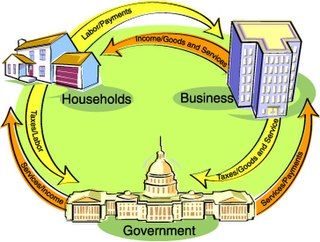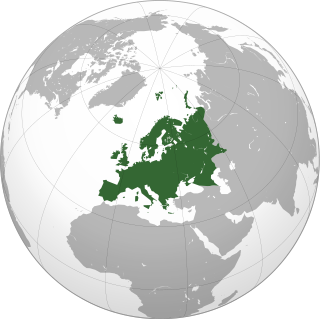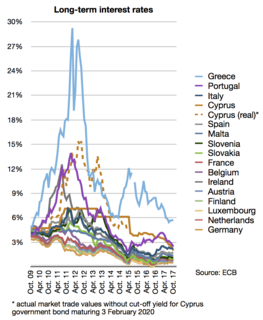
The euro is the official currency of 19 of the 27 member states of the European Union. This group of states is known as the eurozone or euro area and includes about 343 million citizens as of 2019. The euro, which is divided into 100 cents, is the second-largest and second-most traded currency in the foreign exchange market after the United States dollar.
The European Currency Unit was a unit of account used by the European Economic Community and composed of a basket of member country currencies. The ECU came in to operation on 13 March 1979, and was assigned the ISO 4217 code. The ECU replaced the European Unit of Account (EUA) at parity in 1979, and it was later replaced by the euro (EUR) at parity on 1 January 1999.

The economy of Moldova is an upper-middle income economy with a high Human Development Index. Moldova is a landlocked Eastern European country, bordered by Ukraine on the east and Romania to the west. It was a former Soviet republic.

In economics, inflation is a general rise in the price level of an economy over a period of time. When the general price level rises, each unit of currency buys fewer goods and services; consequently, inflation reflects a reduction in the purchasing power per unit of money – a loss of real value in the medium of exchange and unit of account within the economy. The opposite of inflation is deflation, a sustained decrease in the general price level of goods and services. The common measure of inflation is the inflation rate, the annualised percentage change in a general price index, usually the consumer price index, over time.

The economy of Austria is a developed social market economy, with the country being one of the fourteen richest in the world in terms of GDP per capita. Until the 1980s, many of Austria's largest industry firms were nationalised. In recent years, privatisation has reduced state holdings to a level comparable to other European economies. Labour movements are particularly strong in Austria, and they have a large influence on labour politics. Next to a highly developed industry, international tourism is the most important part of the national economy.

A reserve currency is a foreign currency that is held in significant quantities by central banks or other monetary authorities as part of their foreign exchange reserves. The reserve currency can be used in international transactions, international investments and all aspects of the global economy. It is often considered a hard currency or safe-haven currency.

In finance, an exchange rate is the rate at which one currency will be exchanged for another currency. Currencies are most commonly national currencies, but may be sub-national as in the case of Hong Kong or supra-national as in the case of the euro.
The global financial system is the worldwide framework of legal agreements, institutions, and both formal and informal economic actors that together facilitate international flows of financial capital for purposes of investment and trade financing. Since emerging in the late 19th century during the first modern wave of economic globalization, its evolution is marked by the establishment of central banks, multilateral treaties, and intergovernmental organizations aimed at improving the transparency, regulation, and effectiveness of international markets. In the late 1800s, world migration and communication technology facilitated unprecedented growth in international trade and investment. At the onset of World War I, trade contracted as foreign exchange markets became paralyzed by money market illiquidity. Countries sought to defend against external shocks with protectionist policies and trade virtually halted by 1933, worsening the effects of the global Great Depression until a series of reciprocal trade agreements slowly reduced tariffs worldwide. Efforts to revamp the international monetary system after World War II improved exchange rate stability, fostering record growth in global finance.

This page compares the sovereign states of Europe on economic, financial and social indicators.

The economy of the European Union is the joint economy of the member states of the European Union (EU). It is the third largest economy in the world in nominal terms, after the United States and China, and the third one in purchasing power parity (PPP) terms, after China and the United States. The European Union's GDP was estimated to be around $15 trillion (nominal) in 2020, representing around 1/6 of the global economy.

In international finance, a world currency, supranational currency, or global currency is a currency that would be transacted internationally, with no set borders.
There are two different types of world currency unit in use today that have different origins and usages.

This article includes a list of China's historical gross domestic product (GDP) values, the market value of all final goods and services produced by a nation in a given year. The GDP dollar estimates presented here are either calculated at market or government official exchange rates (nominal), or derived from purchasing power parity (PPP) calculations. This article also includes historical GDP growth.
The World Currency Unit (WCU) is an indexed unit of account that stands for a unit of real global purchasing power. Proposed by Lok Sang Ho of Lingnan University, Hong Kong, it was first intended to be the basis for denominating global bonds, a debt instrument that is issued globally and subscribable by people and institutions around the world. Since each unit by design represents a stable unit of purchasing power, the stipulated interest rate on WCU-denominated bonds represents a real interest rate. In principle, the common denomination of bonds by issuers from different parts of the world using the WCU, as well as the greater transparency of real interest rates, will produce more efficient capital markets, as savers and borrowers around the world converge in their understanding of what each basis point of interest means and are protected against two key sources of uncertainty, namely inflation and exchange loss risks.

The WDX Institute is a not-for-profit research body established to further academic research on World Currency Baskets. It is responsible for independently monitoring the Algorithm of the Wocu, a standardized basket of currencies comprising the national currencies of the 20 largest national economies measured by GDP.

A currency basket is a portfolio of selected currencies with different weightings. A currency basket is commonly used by investors to minimize the risk of currency fluctuations and also governments when setting the market value of a country’s currency.

The European debt crisis is an ongoing financial crisis that has made it difficult or impossible for some countries in the euro area to repay or re-finance their government debt without the assistance of third parties.

The Eurozone crisis is an ongoing financial crisis that has made it difficult or impossible for some countries in the euro area to repay or re-finance their government debt without the assistance of third parties.














